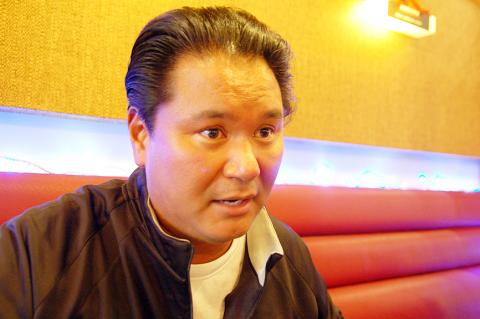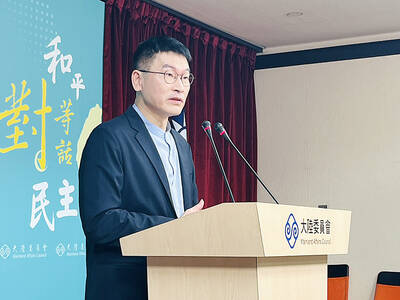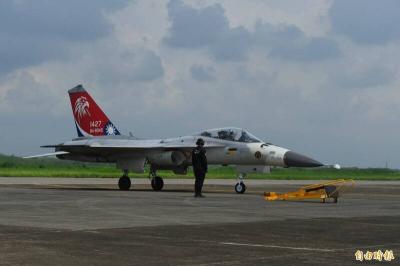Having walked more than 11,000km around the world to promote freedom, human rights and independence for Tibet, the Dalai Lama’s nephew Jigme Norbu began his first “Walk for Tibet” campaign in Asia yesterday in Taipei, and will walk more than 400km to Kaohsiung in 13 days.
“We [Tibetans and Taiwanese] are in the same situation, we should help each other, and we come here to seek help,” Norbu said in an interview with the Taipei Times in Taipei on Thursday. “China is right next door, and maybe they can take over Taiwan one day just like they did in Tibet, we need to let the world know that we need to stop China’s illegal occupation of other countries.”
It wasn’t his idea to advocate for Tibet through long-distance walks. It was, in fact, his father Thupten Jigme Norbu — the eldest brother of the Dalai Lama — who first initiated the walking campaign to raise public awareness of the Tibet issue.

PHOTO: HSIEH WEN-HWA, TAIPEI TIMES
“One thing I wanted to definitely say is that it’s because of my father I’m doing what I am doing, Norbu said. “My father spent his whole life standing up for Tibet’s independence, he traveled all over the world for Tibet.”
Following his father on his travels and walks, seeing what his father did and hearing stories of Tibetans all over the world, Norbu said he feels it’s his responsibility to carry on the mission of his father — who passed away in 2008 — “for the 6 million Tibetans, for the 1.2 million Tibetans who lost their lives standing up for Tibet and for Tibetans who continue to struggle and sacrifice for freedom and human rights in Tibet.”
Born and raised in the US, Norbu said he still — just like most other Tibetans living abroad — retains a very strong Tibetan identity, because of Tibetan stories passed on from generation to generation, the continuous protests of Tibetans both inside and outside of Tibet, and the Tibetan culture and language that have been well-preserved, even in exile.
Norbu said the Tibetan identity was so strong that even brainwashing attempts by the Chinese government could not shake it.
“In 1980, my father and I were officially invited by China to tour around Tibet, because China tried to convince us China had changed Tibet and Tibetans are happy and are living better,” Norbu said. “Unfortunately, for them, we knew it wasn’t true, it’s all lies, people are not happy.”
Such discontent, Norbu said, is expressed through protests by Tibetans, including monks, such as the ones that occurred in 2008.
Walking for a cause, Norbu said, not only allows him to learn a lot and find encouragement, but it also gives him opportunities to give encouragement to other Tibetans.
“During my walks, a lot of Americans — who may be truckers or country people, and who may support the Tibetan cause or not — would come out to shake my hand, they would give us sandwiches and coca-colas, or even invited us to dinner,” Norbu said. “They would say: ‘Wow, so you’re the guy who’s walking so many miles because you believe in something.’”
Each time he walked, Norbu would try to pass through Tibetan communities, and every time they walked through Tibetan communities, they could feel the strong support from fellow Tibetans.
“We get encouraged, but we also try to re-energize younger generation Tibetans — we tell them not to forget where they come from, not to forget what happened to Tibetans, not to forget the 6 million Tibetan brothers and sisters, and not to forget what happened to their fathers and forefathers,” he said.
Although both he and his father insist on pursuing independence for Tibet, Norbu said he respected the exiled government’s position of following the middle-way approach to the Tibet issue — meaning that the exiled government seeks authentic autonomy for Tibet instead of independence.
“I respect their view point, but my path is strictly independent. I respect their decision, and they should respect my decision as well,” Norbu said. “The issue is not whether [to choose] middle way or independence, but we need to act.”
Saying that Tibetans were “tricked” by the Chinese 60 years ago because they were too naive, Norbu said Tibetans are knowledgeable enough nowadays not to allow it to happen again.
He also suggested Taiwanese should try to gain more support in the world — especially from peoples who are also threatened by China — to build up international support to resist threats from China.
Asked how he feels being the nephew of the Dalai Lama, Norbu said that he generally regards the Dalai Lama as a religious and political leader for all Tibetans, and only thinks of him as his uncle secondarily.
However, he recalled some unforgettable moments with the spiritual leader — as an uncle — when he lived as a child in Dharamsala, India, the seat of the Tibetan government in exile, in the 1970s.
“At the time, my family lived with my grandma — His Holiness’ mother — in Dharamsala, and every Sunday, His Holiness would come for lunch,” Norbu recalled. “I was a little boy at the time, I didn’t know much formality, I saw him [the Dalai Lama] just as a monk because of the outfit, I played with him.”
“For me, at the time, he was just an uncle, and we were just like any other nephew and uncle,” he said.
Norbu also remembered when one year, the entire family gathered and had lunch with the Dalai Lama for his birthday: “Everyone was there, the elders — including the Dalai Lama — talked about [what happened] when they were younger. I was very happy to be there and to listen to all those stories, it was fun.”
Norbu’s Walk for Tibet campaign in Taiwan began at 9am in front of Longshan Temple (龍山寺) in Taipei yesterday, and he welcomes anyone who is interested to join him along the way. A detailed itinerary with maps can be found on walk4tibet.blogspot.com.

LOW RISK: Most nations do not extradite people accused of political crimes, and the UN says extradition can only happen if the act is a crime in both countries, an official said China yesterday issued wanted notices for two Taiwanese influencers, accusing them of committing “separatist acts” by criticizing Beijing, amid broadening concerns over China’s state-directed transnational repression. The Quanzhou Public Security Bureau in a notice posted online said police are offering a reward of up to 25,000 yuan (US$3,523) for information that could contribute to the investigation or apprehension of pro-Taiwanese independence YouTuber Wen Tzu-yu (溫子渝),who is known as Pa Chiung (八炯) online, and rapper Chen Po-yuan (陳柏源). Wen and Chen are suspected of spreading content that supported secession from China, slandered Chinese policies that benefit Taiwanese and discrimination against Chinese spouses of

PROMOTION: Travelers who want a free stopover must book their flights with designated travel agents, such as Lion Travel, Holiday Tours, Cola Tour and Life Tours Air Canada yesterday said it is offering Taiwanese travelers who are headed to North America free stopovers if they transit though airports in Japan and South Korea. The promotion was launched in response to a potential rise in demand for flights to North America in June and July next year, when the US, Canada and Mexico are scheduled to jointly host the FIFA World Cup, Air Canada said. Air Canada offers services to 13 of the 16 host cities of the tournament’s soccer games, including Toronto and Vancouver; Mexico City, Guadalajara and Monterrey in Mexico; Atlanta, Georgia; Boston; Dallas; Houston;

The US approved the possible sale to Taiwan of fighter jet spare and repair parts for US$330 million, the Pentagon said late yesterday, marking the first such potential transaction since US President Donald Trump took office in January. "The proposed sale will improve the recipient's capability to meet current and future threats by maintaining the operational readiness of the recipient's fleet of F-16, C-130," and other aircraft, the Pentagon said in a statement. Trump previously said that Chinese President Xi Jinping (習近平) has told him he would not invade Taiwan while the Republican leader is in office. The announcement of the possible arms

ALIGNED THINKING: Taiwan and Japan have a mutual interest in trade, culture and engineering, and can work together for stability, Cho Jung-tai said Taiwan and Japan are two like-minded countries willing to work together to form a “safety barrier” in the Indo-Pacific region, Premier Cho Jung-tai (卓榮泰) yesterday said at the opening ceremony of the 35th Taiwan-Japan Modern Engineering and Technology Symposium in Taipei. Taiwan and Japan are close geographically and closer emotionally, he added. Citing the overflowing of a barrier lake in the Mataian River (馬太鞍溪) in September, Cho said the submersible water level sensors given by Japan during the disaster helped Taiwan monitor the lake’s water levels more accurately. Japan also provided a lot of vaccines early in the outbreak of the COVID-19 pandemic,